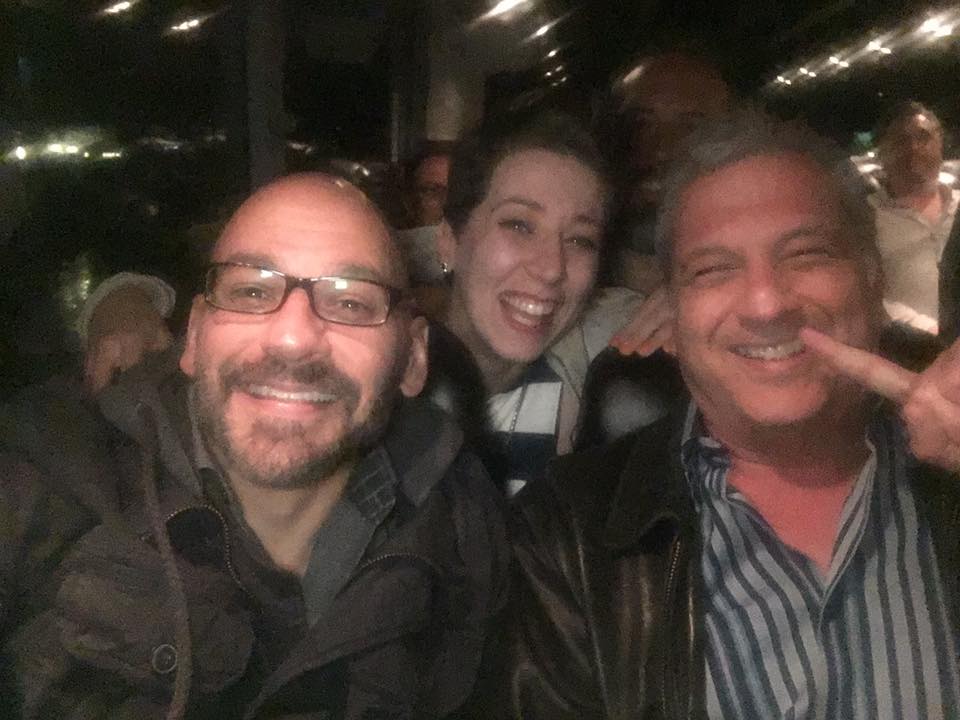We’ve all heard the phrase, “If you’re the smartest person in the room, you’re in the wrong room.”
What nobody tells you is when you find that “other” room, it’s kind of awful.
I mean, it’s a wonderful, magical kind of awful.
Like Disney World on a hot day kind of awful.
You’re sweaty and uncomfortable, but c’mon, Tinkerbell is RIGHT THERE.
Being in a room with people smarter and more successful than you is a lot like that.
Over the past year, I’ve made it a point to get in those rooms.



(Lori Haller, David Deutsch, Kevin Rogers, Parris Lampropoulos, Brian Kurtz… and li’l ole me)
It never fails. Every time I’m in that room, I’m waiting for someone to come up to me and ask, “Ummm… excuse me, ma’am… can I see your credentials please? You’re not on the list.”
This isn’t a new feeling for me. I felt this way the first time Ramit Sethi took me out to dinner.

And rewind back even further… and you’d see me on the sidelines of a NCAA March Madness game working right behind Jay Bilas, with that same pit in my stomach.
(I don’t have a picture of that one because I literally ran away when my friend tried to get a pic with Bilas)
All this made me ask myself recently… when does this stop? How much money do I have to make for which “big name” clients to stop feeling like this?
I used to think it was the 6-figure mark.
Or when big clients would start approaching me.
Or being referenced on someone’s blog.
Or getting podcast invites…
But then I hit each of those and still felt it. It was just a different room.
Is it 7-figures? Is it a book deal? Is it a number of subscribers to my list?
“I want to be better”
I was on a phone call with Parris Lampropoulos recently and he asked me my goals for the year.
In addition to my revenue goals and projects I had underway, I told him this:
“I want to be better”
He asked, “What does that mean?”
Afterall, I’m making money, building a name, and have happy clients.
What does “better” mean?
When I thought about it, the truth is that I felt like some of my recent work was “too easy.” I didn’t have to slog through every project. I could craft converting sales pages without tears.
I didn’t just want sales pages that converted and happy clients, I wanted people to respect me.
And then I remembered. I remembered Ricky Gervais.
Revisiting “Talking Funny”
I’ve written about “Talking Funny” before. This documentary about the creative process for comedians says a lot about processes and voice.
But, if you watch again, you’ll catch a lot about Imposter Syndrome, too.
Particularly from Ricky Gervais.
Now, Gervais is extremely successful by just about anyone’s standards. After his hit show “The Office,” he starred in dozens of movies and built a huge stand-up audience. He’s estimated to be worth about $80 million.
And now he’s in “that room.” The room of Chris Rock, Jerry Seinfeld, and Louis C.K. — instantly recognizable names in comedy.
Take a listen to see how he feels about his success:
NOTE: I recommended this last time I linked to a specific part of this show, and I’ll do it again now: watch the whole thing. There are so many nuggets of creative wisdom in here.
Here’s a few quotes from Gervais that stood out:
25:21:
“Are we allowed to just go out there and being funny? Anyone can be funny”
“I feel that it’s cheating. I feel guilty about just making people laugh. I want them to say, That wasn’t just luck, he worked on that and I couldn’t come up with that.”
28:40
“I feel judged. It’s you.” [The guys in the room]
“I don’t want to do things that anyone can do”
33:08:
“There’s a responsibility. I better have something special to say. It’s not enough to be funny for 60 minutes.”
40:44:
“I suppose the reason I did stand up is I hadn’t earned my spurs in a way. Most comedians slog around for 15 years and they want to get a sitcom. I walked into the BBC with this thing I made and it was ‘The Office.’ When I got done, I thought I should show that I can do this….”
46:35
“This thing that they’re paying us for, what if they discover they can do it themselves”
Louis CK’s response: “They can watch each other play football, too. But that’s no threat to the NFL”
When does Imposter Syndrome stop?
What was fascinating to me about Gervais was that the yardsticks that most people use to measure success: money, fame, audience… are not the yardstick that Gervais uses.
Gervais uses this nebulous feeling to measure his success. One that he can never really attain.
To us, it seems ridiculous. What more could he want? But, it’s no more ridiculous than the feelings that might be rolling around your brain right now.
He thinks what he does is easy. His view of his career is that he stumbled into fame and success with “The Office”… completely forgetting the part that he MADE THAT. It wasn’t luck. It was talent and skill.
I’ve found that many people with talent feel that way. They have this notion that anyone could do what they do (which, consequently is why some of the most fit people make bad trainers and talented athletes make bad coaches).
Have you ever felt that way? That your success thus far is dependant on luck?
The truth is, yes, the right person saying yes is sometimes a matter of timing. But I’ve found that more often than not, it comes from asking lots and lots of people for a yes.
In his book, The Startup of You, Ben Casnocha explores this idea, saying “Almost every case of serendipity and opportunity involves someone doing something.”
Gervais did in fact, “walk in” to BBC… with a great idea! That’s not luck. That’s a talented person taking action toward success.
I started working with Lampropoulos and Deutsch by putting myself in that room.
The success you found wasn’t luck either… YOU DID THAT!
And that feeling you have now, that pit in your stomach that you don’t belong. That just means you’re doing it again. That means growth is happening and it scares the shit out of you.
So when does Imposter Syndrome stop? When you stop. When growth stops.
So take a minute and feel that despair. That fear. And be thankful. Know that you are doing something to make that happen. And that it can’t stop you.
I’d love to hear your stories of how imposter syndrome manifests. When have you felt it? Do you feel it now?


Hey Abbey,
Wow, just loved this piece! Somehow we grow up thinking if something comes naturally to us, is easy and doesn’t require what feels like work, that it doesn’t count. If it’s that easy for me (our thinking often goes) it’s got to be just as easy for everyone else.
I don’t know about you but I love watching someone so engrossed in what they’re doing that they lose track of time. Their work doesn’t feel like work… it energizes them!
I image that’s what it was like for the Mozarts and Michaelangelos of the world. They did what they were good at (okay, REALLY good at) and forgot everything else. They lived a good portion of their life in a state of “flow.”
How frickin’ lucky!
But you’re right. The good thing about Imposter Syndrome is that it does keep us stretching and growing.
Though sure would be nice if we could embrace the growth part and lose the imposter syndrome bit!
Thanks for opening up.
Thanks Nicole! I’ve always said (and Ester Perel says there’s science behind this), that I’m most attracted to people who are “in their element.” Great speakers, musicians, teachers, writers, chefs (check out this piece I did I write like a chef)… when people are doing what they do best, it’s strikingly beautiful.
Hi, prior to 2011 I was totally in my comfort zone, worked hard, played hard & led a full and happy life. My life then took a dramatic turn and threw me into a world where Imposter Syndrome took over & I found myself amongst some very important people serving Her Majesty in Law & Order. I was disputing facts with one the countries most senior judges and totally out of my depth. I found one to be officially recognised as 8th most powerful woman in Britain in 2013 and was against a Barrister who had represented large British Organisations. Imposter Syndrome could not be more evident! I haven’t ever spoke or written but if you are interested I would like to tell? Elise
Hey Elise!
I know what you mean! When we start surrounding ourselves with important and successful people, that’s when Imposter Syndrome is at it’s peak. The good news is, that’s also when we experience the most growth in our lives and careers!
Abbey – what a great reminder that you’ve gotta be uncomfortable to grow!
I’m actually relieved to know imposter syndrome never goes away. Otherwise I hold it out there like a brass ring, “I’ll know I’ve made it because I’ll stop feeling like a phony.”
I still feel it when booking any client, no matter how good of a job I did with the last. I suppose I always will…nothing wrong with that!